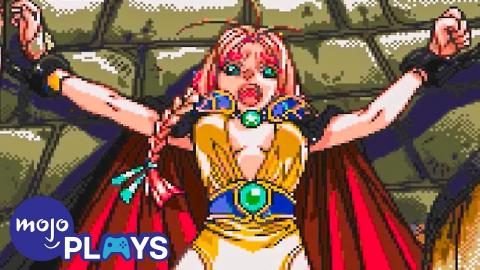Japanese Game Cliches that Offended Westerners

advertisement
VOICE OVER: Adrian Sousa
WRITTEN BY: Jarett Burke
Different cultures mean different sensibilities, and with games being played by people all over the world, things that are a-ok in one nation might not sit too well with others. Welcome to MojoPlays and these are the things are common tropes in Japanese games that some westerners took offence to.
Japanese Game Cliches That Offend Westerners
Welcome to MojoPlays and today we're counting down our picks for the Japanese Game Cliches That Westerners just don’t understand and some even get offended by. Sorry in advance if our list about things that offend other people offends you.
Transgender Characters
The topic of transgenderism is quite complicated in Japan. As of 2018, transgender Japanese people are forced to undergo sterilization - a practice that has been widely decried. This discrimination against trans people extends to gaming history as well, most notably in 1989's "Final Fight". With Nintendo of America not comfortable with male vs. female violence in the original game, Capcom sought to change female characters Roxy and Poison to transgender characters to make violence against them more "acceptable". Nintendo of America reportedly balked at this proposal and the characters were replaced with generic male thugs.
Rubbing & Touching
There's just something about rubbing and touching female characters in video games to progress gameplay that just really rubs some Westerners the wrong way. Let’s be honest, games like "Monster Monpiece" (a card game, by the way) could easily be mistaken by someone listening from another room to be full-on pornography, what with the girls moaning to the touch and getting overly excited before stripping off a layer of clothes. The card-game itself may actually be good, the problem is that most people will never find out because it's simply too embarrassing for them to play it. The Japanese version of Fire Emblem Fates originally had a game mode very similar to this, albeit much more tame. This game mode would be significantly toned down even further much to the dismay of the hardcore fans of the series.
Blackface
There's a history of using blackface in Japan to impersonate black people, especially in Asian hip hop and pop groups. For many Japanese people, it's considered an innocent form of imitation, but in the west it's been recognized as a deeply troubling act for years. It's a topic that's been in the news as of late, what with a Japanese TV show accused of racism for featuring a character in blackface. It's even found its way into Japanese video games in the past as well, such as the boss character of Oil Man in "Mega Man Powered Up" originally being based on blackface stereotypes. And let’s not forget about the Pokemon Jynx, who had it’s original appearance altered after much controversy.
Fan Service
The definition of fan service is content added to a work of fiction with the intent of pleasing the audience. The term originated in Japan relating to anime and manga and, more specifically, the increased nudity and sexualization in each genre. But this isn't a recent trend, however, nor is it contained to anime and manga. Take for instance, the Japanese version of "Final Fantasy 6," which had a lot of partial nudity that was censored in the North American version. It's certainly nowhere near pornographic, but the difference between both versions highlights the differing cultural attitudes toward nudity and sexual content.
Low Age of Sexualization
One of the more disturbing clichés from Japan is the trend of oversexualizing young girls in manga and anime in what's called the "Lolita Complex" or "Lolicon." While it may not reach levels as graphic in manga and anime, the same trend occurs in video games as well, with many Japanese characters receiving serious makeovers for North American releases -- Xenoblade Chronicle X's Lin is one such example. The Japanese government does have laws regarding child pornography, yet -- thus far -- they do not extend to fictionalized/animated media. But, if Sony's recent censorship of Japanese games is any indication, it's likely any future sexualization of minors will not see the light of day.

